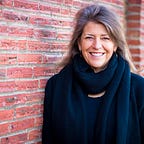How A Writing Assignment Turned Into a Sex Talk
Every semester — save for those during the pandemic — I ask my students to go out into the world to hear a writer who is working on the type of writing that we’ve been reading and writing in class. In my freshman composition classes, they have the option to listen to a playwright, poet, fiction writer, or screenplay writer.
As with almost all semesters and with this particular class, most everyone waited until the last minute. Can’t be helped. If you were out there reading in the Bay Area at some point the past thirty years, you undoubtedly met some of my students, the ones rushing in the door. They were the ones with the notebooks, and once smartphones were invented, they likely asked you if they could take your photo (they need proof of the event, and somehow don’t know I meant simply a flier or a bookmark).
In some of my classes, this assignment has caused much consternation. I have spent a great deal of time trying to explain the difference between fiction and nonfiction — and in recent years, this has been a hard thing to define. But once they figured it all out, there they went into the universe.
In this class, as with many classes where the population has been composed of mostly nonnative speakers, this assignment can be rough. But it seemed as though things went well, and the day came for me to collect the papers. Before moving on, I asked my students if anyone had a story to tell about their adventures. So I looked around, and one of my students — a funny, tongue-in-cheek Korean man — raised his hand.
Turns out, he put off the assignment because he always thought people who wrote or talked about books were arrogant. But this was for school, and the night before the due date, he drove wherever he could find a reading. This reading was at A Different Lights bookstore, and the book was Band Fags by Frank Anthony Polito.
As he sat there waiting for the event to begin, he realized that all the audience was made up of men — very good looking men. Apparently, a couple of the men asked him where his boyfriend was, and he didn’t know what to say.
“I didn’t want to tell them I wasn’t gay because it would offend them,” he said.
The class roared at this, and I laughed along, too, happy with his good-natured approach. But he kept going on, telling us about how much the event moved him. He said he finally understood that this story was about two gay best friends 100 years ago (well my student thought it was 100 years ago, but actually it is set in 1982) was not just about gay people but everyone.
When my student asked Polito why he wrote about gay people, Polito said, “I wanted to tell everyone out there that we’re not different, that we should not be categorized into a certain type of human being because we’re just ordinary people.”
As the event ended, a few members of the audience asked my student to go out for a beer, and he did.
“Did you have fun?” I asked.
“It was great,” he said.
The class roared again.
And then he said that he had the amazing chance to look at the world from a different point of view.
The class couldn’t get enough of this story, and I had the opportunity to talk a little about this corner of the world, this lovely part of California, where we still had to fight for rights but where who you sleep with isn’t quite the focus that it might be in, say, Topeka, Kansas. Korea apparently has a much different view of the world in terms of sex and family, more than I have ever imagined. When we were reading Juno, the screenplay by Diablo Cody, one of my students asked if it was legal for a single woman to adopt a baby. Another asked if it was legal to get an abortion. They could not believe that Juno’s parents didn’t absolutely kill her when they found out she was pregnant. Kill her and then take her to get an abortion.
So with the book Band Fags and its themes in mind, we talked about what “right” sex was and what the laws were. And then we came up with four rules for sexual interaction, which I am sharing with you now.
Here are the criteria for “okay” sexual relations:
- Participants are of the same species.
- Participants are both alive.
- Participants are of age.
- The sex is consensual.
My students talked a little bit more, and then we went ahead and read poetry for an hour.
